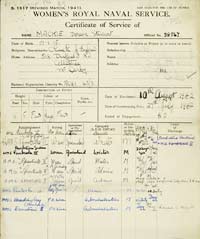Women on the Front Line
Women throughout history have been involved in military action despite the traditional view of women as non-combatants.
Recent archaeological evidence suggests that the Roman army in Britain not only fought its legendary female opponent Boudicca, but also included Amazon warriors in its ranks.
During the First and Second World Wars women served in the uniformed services, but in the United Kingdom mainly on support duties, not in combat roles. Nevertheless many women played a critical part in ensuring the successful outcome of the war.

Second World War ATS papers (Private collection)

Detail from the Record of Service of Doreen Mackie in the Women's Royal Naval Service during the Second World War

Press advertisment for female drivers (Westacott Collection)
Hundreds of women worked on the vital top-secret code breaking work at Bletchley Park, which they could not reveal at the time even to their closest friends and family. The women's services, including the WRNS (Women's Royal Naval Service) and the ATS (Auxiliary Territorial Service), undertook a wide range of work often in uncomfortable and dangerous conditions even if they were not strictly combat soldiers.
…the ATS took over the jobs of 'SPOTTERS' who stood atop the Command Post with their binoculars in all weathers and at short range could identify all aircraft - friend or foe, and 'PREDICTORS' who supplied information to the 'PLOTTERS' working at their huge illuminated map underground. By the end of 1941, 15,000 men had been replaced by 18,000 ATS. These were the first girls to take their place in a combatant role in any army in the world.
It is in civil wars and insurrections that women have most often been directly involved in armed conflicts - sometimes as victims, sometimes as active participants. The experiences of women in the English Civil War, of female Jacobites in Scotland in 1745, of Maori women in New Zealand in 1863 and in the recent conflicts in Bosnia, Rwanda and Afghanistan illustrate both their diversity, yet also their similarities, over time and place.
In 1643 Lady Harley, the wife of Sir Robert Harley, was besieged in their castle at Brampton Bryan, Herefordshire by Royalist forces while her husband and sons were fighting for the Parliamentarian cause during the English Civil War. The siege was lifted but Lady Harley caught a severe chill resulting in her death in October 1643. The castle fell to Royalist forces later in the war.

Letter from Wallop Brabazon, Sheriff of Herefordshire, to Lady Brilliana Harley at Brampton Bryan Castle c.1642-1643 (Pw2 Hy 200)
Madam I thanke you that you will impart this buysiness unto me concerning these Captaines & their boulde request I shall endeavour & will unto the uttmost of my power perswade & will prevayle so far with them that they shall doe you noe Iniurye seeminge these Captaines are desirous of a Bucke [deer] I would desire you to fitt them though they will never give you thankes [...]
From 1746, this anonymous informant complains of the active role women have played in the Jacobite uprising.

Letter from 'P.O.', Edinburgh, to Henry Pelham, 22 Oct. 1746 (Ne C 1844/1-2)
I begg Leave att this time humbly to suggest that the female sex have had no small part in prompting & Carrying on this weeked Rebellion Some have been Amazons from a ferm Belief that women cannot commet treason & that the severe sanction of the Law is a Joke It would be good for the world & the fair Sex in pertecular that they be undeceaved & that Some one or more of the Remarkable offenders (& many such there are) be brought to a severe examination or some how tried & punesh[e]d att Lest in thar Dowrres [their doweries].
Sir George Grey writes regretting the death of several Maori women in the action at Rangiriri in 1863.

Letter from Sir George Grey, Governor of New Zealand, to the 5th Duke of Newcastle under Lyne, 9 Dec. 1863 (Ne C 11092/1)
Even their women and young girls now take an active part in it. They assure me that in the action at Rangiriri on the 20th November they had nine women killed and many wounded - amongst the latter was a sister of the so called native King, as kind good tempered a woman as I have ever known, and amongst the former, a girl daughter of one of the principal chiefs who was quite remarkable for her good looks, and was I am told in every way a good and amiable girl.